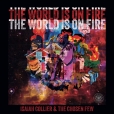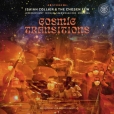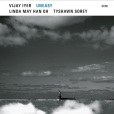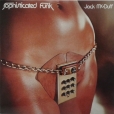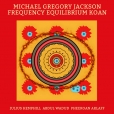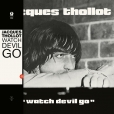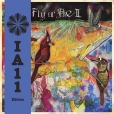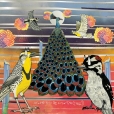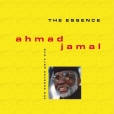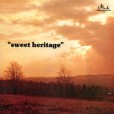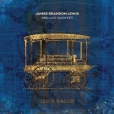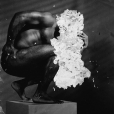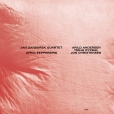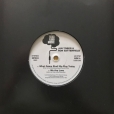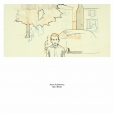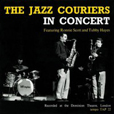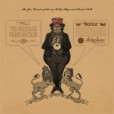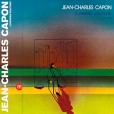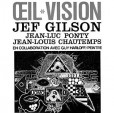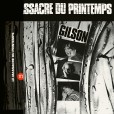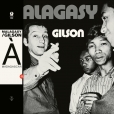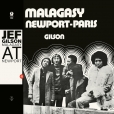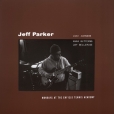Your basket is empty

‘Documenting a 2023 West Coast tour, this double LP goes deep. On 2023-05-12 Set II, the rhythm section gives Collier plenty of space to develop long, soulful saxophone lines that are full of invention and dynamic variation, culminating in a climax of squawking multi phonics, woody bass runs and multi-directional drumming. Best of all is a riveting set dedicated to Don Cherry, where Collier vocalises freely through a megaphone, setting off its alarm at key points’ (The Wire).
With Tyshawn Sorey and Linda May Han Oh, exploring Iyer originals, Geri Allen’s Drummer’s Song and Cole Porter’s Night and Day.
Reduced LP price, briefly.
Quintessential NYC loft action from 1977, with such a killer line-up: Julius Hemphill, Abdul Wadud, and Pheeroan aKLaff.
‘For those of us into the obscure, lively corners of free music, it’s an essential gem,’ says Foxy Digitalis.
“These guys are all heroes of mine. I’ve learned so much (still learning) from all of them. To hear them all together like this is a real gift. What a combo! I can’t believe this happened more than forty years ago. It sounds like the future. I’m so thankful the tape was running to document this extraordinary moment” (Bill Frisell).
‘Four years after a first album on the Futura label in 1971, Jacques Thollot returned, this time on the Palm label of Jef Gilson, still with just as much surrealist poetry in his jazz. In thirty-five minutes, the French composer and drummer, who had been on the scene since he was thirteen — recording Gilson LPs when he was just sixteen — established himself as a link between Arnold Schoenberg and Don Cherry. Resistant to any imposed framework and always excessive, Thollot allows himself to do anything and everything: suspended time of an extraordinary delicacy, a stealthy explosion of the brass section, hallucinatory improvisation of the synthesisers, tight writing, teetering on the classical, and in the middle of all that, a hit, the title-track — which Madlib would one day end up hearing and sampling.
‘In a career lasting half a century, centred on freedom, Jacques Thollot played with a roll-call of key experimental musicians (Don Cherry, Sonny Sharrock, Michel Roques, Barney Wilen, Steve Lacy, François Tusques, Michel Portal, Jac Berrocal, Noël Akchoté...) who all heard in him a pulsation coming from another world.’
Recorded live in Paris in 1994 and New York City in 1995. The band includes Idris Muhammad, Manolo Badrena, and George Coleman. Beautifully constructed, grooving, percussive versions of a tasty mixture of standards and originals.
The pianist James Edward Manuel’s only release is one of the deepest custom-press jazz recordings of them all.
Jaman studied under greats like Earl Bostic and Horace Parlan. Gigging on the Buffalo club scene, one of his early trios included the renowned bassist John Heard and drummer Clarence Becton, till both were poached one night by a visiting Jon Hendricks. Other sidemen include Sun Ra Arkestra bassist Juini Booth and Ahmad Jamal regular Sabu Adeyola (also of Kamal & The Brothers).
Pressed in tiny quantities by the Mark Records custom service in 1974, and issued with a stock landscape cover, Sweet Heritage presents a soulful mixture of covers and originals. In particular the flying, spiritual sound of Free Will and the upful, Latin-tinged In The Fall Of The Year — both Jaman compositions — have turned the LP into a legendary collector’s classic.
A gospelized, autobiographical collage of raps, beats, modern jazz and songs, featuring the in-demand drummer alongside an expansive roster of collaborators bringing together artists from his hometown of Houston (vocalists Corey King, Lisa E. Harris, Fat Tony, Jawwaad Taylor), those he became close to over several years living in LA (Sam Gendel, Zeroh, Mic Holden, Josh Johnson, fellow International Anthem artist Carlos Niño), and other creative partners from his life-long journey in sound (Chassol, Svet, Kenneth Whalum).
‘Rooted in his faith, Jamire opens the album with Hands Up, a devotional hymn cut against the stark reality of the modern world that sounds like an apocalyptic middle-grounding of Kendrick Lamar’s To Pimp A Butterfly and Merry Clayton’s Gimme Shelter. Whether in the rousing, spiritual Just Hold On or the fluid verses of Fat Tony on Safe Travels, the music exists in the tension between higher realms and social realities — what Jamire calls the “duality of a personal thing and what I’m seeing in my community, in the Black community, as a Black man.” ‘
Playing tenor and bass saxophones, clarinet, flutes, percussion, in 1970 — with Terje Rypdal, guitar and bugle, Arild Andersen bass, african thumb piano and xylophone, and Jon Christensen, percussion.
With Joshua Abrams, Hamid Drake, Jonathan Doyle, and Josh Berman.
‘At the beginning of 2017, Chicago vibraphonist Jason Adasiewicz brought a quintet into the hallowed halls of Electrical Audio, Steve Albini’s legendary studio, to record the soundtrack for a new film, Roy’s World: Barry Gifford’s Chicago, a documentary by Rob Christopher based on the Roy’s World series of short stories by Barry Gifford.
‘It’s really an ensemble effort, the spotlight on the gorgeous compositions and spacious sensibility, a perfect complement to Christopher’s fascinating, beautiful film, which has a noir vibe set in a fifties version of the Windy City conjured by means of vintage found footage, narration by Willam Dafoe, Matt Dillon, and Lilli Taylor, and Adasiewicz’s score. Check the balafon-led groove of Blue People, nodding to Fela… and bluesy, swinging charts throughout, with elements that might recall the post-hard-bop Blue Note records of folks like Andrew Hill, Sam Rivers, and Grachan Moncur III, Roy’s World is more than a great soundtrack record, it’s a killer programme of new tunes played by a monstrously strong band recorded and mixed at one of the world’s finest studios.’
Featuring Ronnie Scott and Tubby Hayes, from 1958.
The fabulous, legendary LP originally issued by Lumen in 1972, born out of several visits to Madagascar by Gilson and fellow musicians from Paris, and their collaborations with musicians on the island.
Fittingly the first trip was on May 13 1968, the day of the general strike in France: this is tumultuous, insurgent, joyous, blisteringly swinging, outernational Malagasy jazz, including a a charged, unmissable The Creator Has A Masterplan, and Avaradoha, a composition by Madagascan saxophonist Serge Rahoerson (who leads this recording), which was the anthem of the rotaka protests in 1972, bringing down the neo-colonial First Republic of Madagascar. The closer showcases various traditional Madagascan percussion instruments, played by the same trio which that year recorded Le Massacre Du Printemps, Gilson’s avant-noise homage in memoriam of Stravinsky.
Hot.
Jef Gilson, Sylvin Marc and his cousin Ange Japhet, Del Rabenja, Gérard Rakotoarivony and Frank Raholison, blending together bebop, sub-Saharan roots and electric funk.
Requiem Pour Django, Dizzy 48 and Anamorphose — renamed Salegy Jef after this re-routing via Madagascar — rejuvenate Gilson compositions from the previous couple of decades. Newport Bounce is a reworking of Interlude, recorded by Gilson in 1969 with Philly Joe Jones. Le Newport was a club in rue Grégoire de Tours, Saint Germain des Prés.
‘2 LPs of long-form, lyrical, groove-based free improv recorded live at a bar in LA’s Highland Park neighborhood with just enough space in the back for Parker, drummer Jay Bellerose, bassist Anna Butterss, & alto saxophonist Josh Johnson to convene in extraordinarily depth-full & exploratory music making. Gleaned for the stoniest side-length cuts from 10+ hours of vivid two-track recordings made between 2019 & 2021 by Bryce Gonzales, Mondays at The ETA is a darkly glowing séance of an album, brimming over with the hypnotic, the melodic, & patience & grace in its own beautiful strangeness. Room-tone, electric fields, environment, ceiling echo, live recording, Mondays, Los Angeles. It belongs in the lineage of such canonical live double albums recorded on the West Coast as Lee Morgan’s Live at the Lighthouse, Miles Davis’ Friday & Saturday Night at the Blackhawk & Black Beauty, & John Coltrane’s Live in Seattle.
‘While the IVtet sometimes plays standards &, including on this recording, original compositions, it is as previously stated largely a free improv group — just not in the genre meaning of the term. The music is more free composition than free improvisation, more blending than discordant. It’s tensile, yet spacious & relaxed. Clearly all four musicians have spent significant time in the planetary system known as jazz, but relationships to other musics, across many scenes & eras — dub & Dilla, primary source psychedelia, ambient & drone — suffuse the proceedings.’
